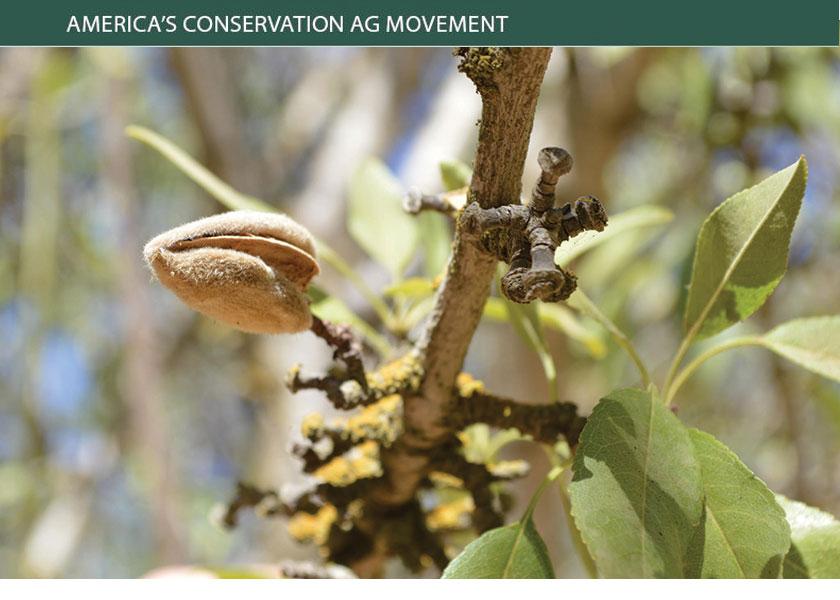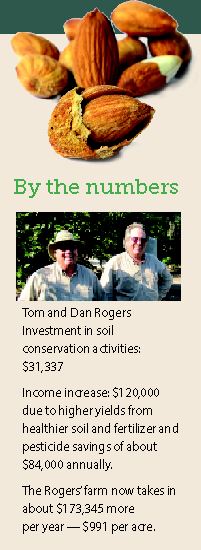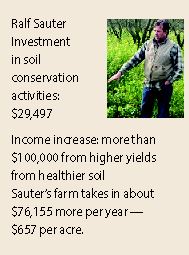Almond growers adapt soil health management, increase yield 10 to 20%

 Building trust in food begins with empowering farmers through one of the largest and most diverse conservation- and sustainability-focused public-private partnerships in our nation’s history: America’s Conservation Ag Movement. To find the latest news and resources related to the Movement, visit AgWeb.com/ACAM.
Building trust in food begins with empowering farmers through one of the largest and most diverse conservation- and sustainability-focused public-private partnerships in our nation’s history: America’s Conservation Ag Movement. To find the latest news and resources related to the Movement, visit AgWeb.com/ACAM.
Adapting soil health management measures can increase a farm’s yield and yearly income substantially, highlight two recent case studies from the American Farmland Trust.
Brother duo Tom and Dan Rogers farm 175 acres of almonds on land near Madera, Calif., that’s been in their family for decades. By adapting soil health management measures, the brothers have increased their yield by 10% and their annual income by almost $175,000. In nearby Merced County, almond farmer Ralf Sauter took over 116 acres of protected farmland from his mother-in-law 14 years ago. In that time, he’s increased his yield by 20%, which he attributes to his sustainable soil-management practices.
Tom Rogers received the Farm Water Stewards Award in 2014 for his commitment to protecting water quality and soil health. He attends workshops every year to learn more about how to keep his soil in top shape — as he said in a case study by AFT, “everything relates to the soil.” The Rogers use a variety of soil health conservation measures, including drip irrigation, composting, mulching and conservation cover.
Sauter took over the farm from his mother-in-law Jean Okuye, a noted figure in the San Joaquin conservation agriculture scene as the president of the East Merced Resource Conservation District. Okuye started using cover crops, compost and micro-sprinkler irrigation at the farm, as well as owl boxes, hedgerows and solar energy. When Sauter took over, he ran with what she’d started. Sauter now uses a variety of soil health conservation measures, including fertigation, composting, mulching and conservation cover.
The Rogers began growing almonds using solid-set sprinklers, though soon after they switched to micro sprinklers. Then, about five years ago, they installed a double-line drip irrigation system. This increased their fertilizer efficiency, Tom says, and conserved water.
Similarly, Sauter says implementing nutrient management strategies such as leaf sampling and fertigation increase his fertilizer efficiency. Using fertigation ensures every location gets the correct fertilizer rate at the right time.
Both the Rogers and Sauter have started to maintain weeds and native plants as conservation cover over the winter, which has increased the number of beneficial insects on the farm by providing them habitat. This cut down on the Rogers’ insecticide use by 72%, and Sauter says he went from spraying miticide five times a year to one time a year.
Tom samples leaves and soil from his orchard regularly to monitor nutrition and make changes early if health takes a turn for the worse. In doing this, he switched their fertilizer from a standard blend to a specialized ammonium thiosulfate blend that includes nitrogen, micronutrients, microbial products and humic acids. The blend helps stabilize the potassium content of the soil and boosts its health. It also means the Rogers can forgo potassium applications, which saves them $160 per acre every year.
The Rogers and Sauter both began hiring a brush shredder to shred their orchard prunings into mulch, instead of just burning the prunings. They say laying mulch increased organic matter in the soil as it decomposed, which stimulated microbial activity. Applying compost also improves the soil’s microbial activity, Tom says.
The benefits didn’t come without an economic investment — all together, the Rogers’ soil conservation activities increased their net cost about $31,337. However, the investment pales in comparison to a $120,000 increase in income due to higher yields from healthier soil and fertilizer and pesticide savings of about $84,000 annually. The Rogers farm now takes in about $173,345 more per year — $991 per acre.
Sauter’s soil conservation activities increased his net cost about $29,497 — but this investment paid off. The higher yields from healthier soil increased his income by more than $100,000. When balancing the higher costs and higher income, he found his farm takes in about $76,155 more per year — $657 per acre.
Tom says this process has reaffirmed his belief in the importance of soil health management. He and Sauter both say the financial benefits far outweigh the costs, and though some of these processes might take a little more work to maintain, they’re not only increasing their yield but making the air, water and soil around them cleaner and more sustainable for generations to come. P
Read the full ACAM - Sustainability and specialty crops publication here.









